What Is Gaslighting? How to Spot It and Stop It

In this article
“That never happened. You must be going crazy.”
“It’s just your imagination.”
“Are you sure? You never remember things accurately.”
If your partner repeatedly says things like these to you, they may be using an insidious technique that mental health professionals call “gaslighting.” If that happens, your experiences, words, and emotions are twisted and used against you, so you may even start questioning your thoughts, feelings, and your own perception of reality.
Gaslighting, named 2022 Word of the Year by Merriam-Webster, is a subtle form of emotional abuse, which is often hard to spot. Still, if it’s done repeatedly over a long period of time, it can have a highly negative effect on a victim’s self-esteem and confidence.
In this article, we will look at common signs of gaslighting and its causes. We will also talk about how to recognize gaslighting in different types of relationships and how to respond to it.
What is gaslighting?
Gaslighting is a form of psychological manipulation where the manipulator is trying to get someone else to doubt themselves and their grasp of reality, memory, and judgment. Finally, the victim of gaslighting may start to wonder if they are going crazy.
It’s very likely that the victim will believe whatever their abuser tells them regardless of their own experience of the situation.
The abuser uses this tactic to exert power and gain control over the other person. The goal of the gaslighter is to reduce the victim’s self-esteem and make them dependent on the abuser for longer.

The term “gaslighting” comes from the 1938 play “Gas Light,” which was adapted into the 1944 movie. The story features a murderous husband who manipulates and tries to convince his wife that she’s going mad so he can commit her to a mental institution and steal her inheritance.
Now, the term is used to describe toxic relationship dynamics that involve power and control.
The 5 types of gaslighting
Gaslighting is a way of manipulating, which is used to make a gaslightee question their perceptions. People who tend to gaslit usually use false facts to create confusion.
This makes their victim doubt their own memory and question their version of events.
Gaslighting is pure form of abuse that involves several types. It is important to understand these types of abuse to be able to protect yourself from the harm it may cause:
- Outright Lying: A person lies to you even when there is evidence they are not right. It makes a gaslightee question their understanding of the situation.
- Coercion: A person controls and, sometimes, even uses force to make a gaslightee agree with their version or do something a victim wouldn’t do without the gaslighter’s negative influence.
- Scapegoating: A person lays all the blame for problems on an individual they gaslit.
- Reality Questioning: A person makes a gaslightee doubt their reality, and this makes them begin to feel confused.
- Trivializing: A person denies or minimizes the feelings or problems of a gaslighted individual.
As you can see, gaslighting isn’t simply about lying to someone. It is also the tactic that people use to control others in a way of making them question their reality.
What is self-gaslighting?
Sometimes, gaslighting may become deeply internalized, shifting into the mode that can be called self-gaslighting. It may look like suppressing emotions and thoughts. It often happens when someone says something insensitive or hurts your feelings.
Despite the fact that you realize that your feelings were hurt, you start thinking almost instantly and impulsively that you are just too sensitive or dramatic and are making a too big deal out of it.
You ignore that your emotions are valid, and you have the right to feel and express them. But you can work on challenging that by affirming your emotions and your experiences and practicing self-compassion.
Gaslighting can occur in any relationship
It can happen in controlling friendships, between parents and children, and between co-workers. We can also see it in politics and on social media.
It’s a common technique of abusers, narcissists, dictators, and cult leaders.
No matter where gaslighting happens (in a dating relationship, marriage, professional relationships, or elsewhere), it’s important to be aware of the red flags that you might be a victim of this abusive behavior.
Gaslighting techniques
Gaslighting is abusive behavior. It’s not in and of itself an official mental health diagnosis. But it’s often behavior displayed in connection with several personality disorders (Narcissistic and Borderline disorder, for example), and it has gained credibility as a real problem.
People who gaslight others use a variety of gaslighting techniques:
- Withholding – the abuser refuses to engage in conversation, pretends they don’t understand you, refuses to listen, and declines to share their emotions
(e.g., “You are just trying to confuse me”) - Trivializing – the gaslighter belittles or disregards the other person’s feelings, making the victim believe their thoughts, concerns, and needs aren’t important
(e.g., “You are too sensitive”) - Blocking /Diverting – the abuser changes the focus of a conversation and questions the victim’s credibility instead
(e.g., “You are imagining things”) - Countering – the manipulator questions the victim’s memory of events, like they’re misremembering something, even when the victim recalls things correctly
(e.g., “You have a bad memory”) - Forgetting /Denial – the abuser pretends to forget things or how they happened; they may deny having said something or accuse the victim of making things up
(e.g., “That never happened. You are making that up”) - Stereotyping – the gaslighter intentionally uses negative stereotypes of the victim’s gender, sexuality, ethnicity, race, nationality, or age to manipulate them.
(e.g., “There goes another clueless female driver!”)
What does gaslighting sound like?
Gaslighting can take many forms, which are sometimes difficult to trace.
However, the following expressions are quite common for people who engage in gaslighting behavior:
- You know I never said that
- You’re imagining things
- You’re upset over nothing
- It’s your fault
- You made me do that
- You’re always twisting things
- You’re not thinking clearly
- I was just joking! You take everything personally
- You know you sound insane right now, right?
- You’re too sensitive
- You’re always making staff up
- You’re making a big deal out of nothing, like always
- Just calm down. You’re so dramatic
- You always jump to the wrong conclusion
- You’re remembering things wrong
- You’re being paranoid
Why is gaslighting dangerous?
Gaslighting can happen through seemingly small offenses. It is done gradually, over time, so victims may not realize how much they have been brainwashed with lies, omissions, and negations.
It is dangerous because it undermines the victim’s sense of self-belief.
If someone gaslights you, you can become anxious, confused, isolated, and depressed. And you can lose all sense of what is actually happening. You may start wondering what is wrong with you.
At some point, you may feel you can no longer trust your own instincts and feelings. Then, you may start relying on your abusive partner more to define reality, creating a very difficult situation to escape.
Over time, a victim of gaslighting may start to believe that they can’t trust themselves, or that they have a mental health disorder.
Signs that gaslighting is affecting your mental health
When you are being gaslighted, it can have a negative impact on your mental health and lead to depression and anxiety. It is also thought to be linked to nervous breakdowns and panic attacks.
That’s why it’s important to recognize when you are experiencing gaslighting.
Since gaslighting is a sophisticated form of emotional abuse that is subtle in nature, it can be hard to detect. But still, there are some red flags.
Look for signs below to find out if you’re being gaslighted:
- You are afraid of expressing your emotions and question your judgment and perception of reality. This can feel like “walking on eggshells” around that person, always trying to anticipate their needs and reactions.
- You feel less confident and more anxious than you used to be.
- You often apologize for what you are or what you do because you assume that other people are disappointed in you.
- You feel insecure and vulnerable.
- You feel confused and are constantly second-guessing yourself.
- You distrust yourself and find it hard to make simple decisions.
- You feel like you are not good enough and that everything you do is wrong.
- You are wondering if you are too sensitive.
- You are feeling powerless and isolated from your family, friends, and other people who care about you.
- You feel hopeless and can’t enjoy life.
Why do people gaslight?
Although gaslighting is never justified, sometimes, the gaslighting person just doesn’t know they’re doing it. That’s unconscious gaslighting. Many of us might be guilty of some mild form of this behavior occasionally due to a lack of self-awareness.
It happens when we refuse to hear what our partner has to say even if we know they are right or when we persistently disagree over some minor quibble, even when we aren’t sure of our position.
You may do it because you are unwilling to admit that you are wrong or because of your own insecurities that come out of experiences in previous relationships or from your childhood.
But in extreme cases, it‘s a form of emotional and psychological abuse that occurs in abusive relationships.
Abusive people typically gaslight as they want to gain control and power over someone else. It’s behavior they learn by watching others, for example, as a survival mechanism when raised by a gaslighting parent.
The exact reasons why they do it will be different from case to case, but still, there are some patterns:
- Some people may believe they are entitled to control others or that their feelings and opinions matter the most.
- Sometimes, they may think it’s the only way to sustain the relationship.
- Some people find pleasure in power and enjoy controlling others.
Either unconsciously or consciously, gaslighters have the beliefs that:
- It’s acceptable to control other people
- It’s normal to override another person’s reality
- Being challenged is unacceptable
- Their reality is the only reality and is the absolute truth
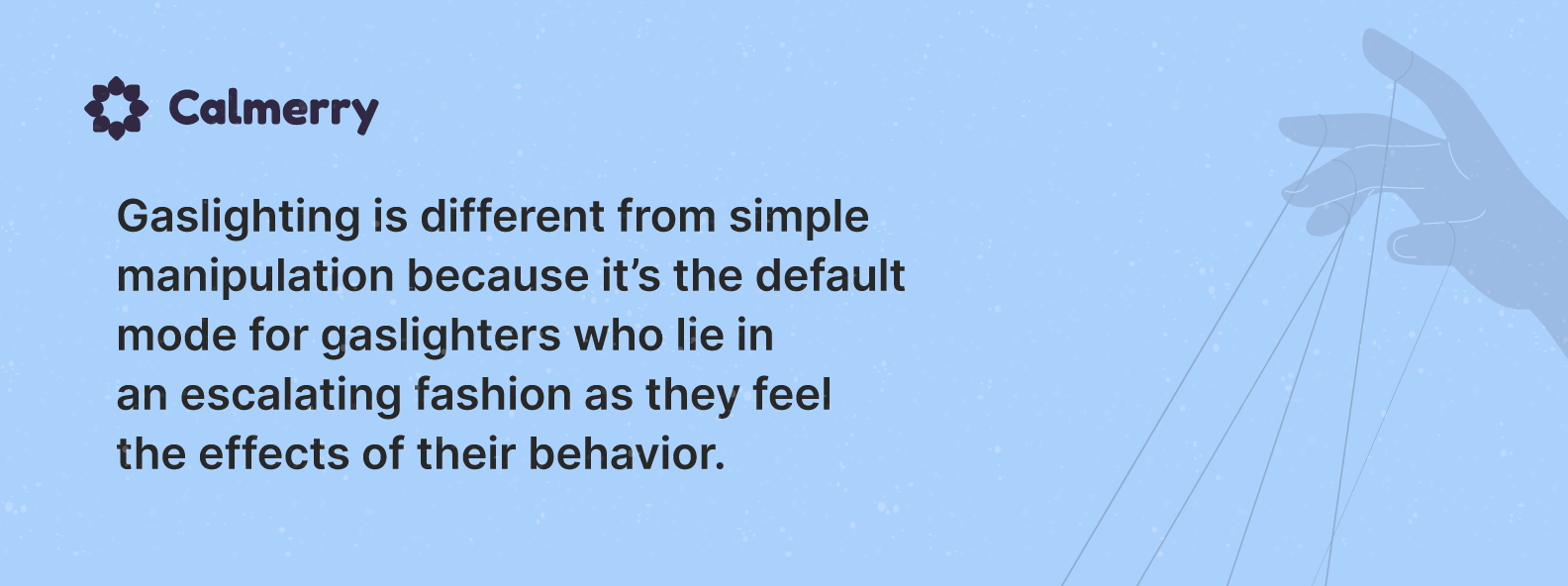
Is gaslighting manipulation?
Gaslighting is different from simple manipulation because it’s the default mode for gaslighters who lie in an escalating fashion as they feel the effects of their behavior.
It’s not an isolated or occasional event. It’s their way of life, and they do it for the sake of doing it to gain control of you and confuse you.
Gaslighting is more than just a lie. It is different in that when someone tells a lie and is presented with the facts to expose the lie, most people will typically own up to the lie and explain the reason for lying.
When an individual is gaslighting and presented with facts that expose a lie, they will instead double down on their reasons and then flip this to deflect the attention onto the other person as if they are crazy or paranoid.
Gaslighting and narcissism
Some abusive people may have narcissistic personality disorder (NPD). Such people believe that they are special and the world revolves around them. They are self-centered and don’t have any interest in other people unless it serves a certain purpose for them.
Narcissists lack emotional empathy and can’t connect to what other people are feeling or experiencing. They do have cognitive empathy, which allows them to understand what emotions mean.
However, they simply do not care about the impact of that emotion on the other person. Often, they can use their knowledge of cognitive empathy to gain success in their manipulation of others further.
They often use manipulation to achieve their personal goals and feel no remorse for what they have done.
In reality, they are often deeply insecure individuals who use these strategies to cope and survive in the world. They seek needs from others that feed their ego while also keeping the other person confused and beneath them to control the relationship, maintaining their hold on the emotional supply.
Examples to spot gaslighting
Psychologists first defined gaslighting as an interpersonal dynamic between two people, often in a romantic relationship, in which one partner manipulates the other into doubting their sense of reality.
Since then, the term has expanded, and now, it includes other kinds of relationships.
Gaslighting as psychological violence is actually present in many other aspects of our day-to-day life.
Examples of gaslighting include abusers in romantic relationships who blame their victims for victimization, toxic parents, and manipulative bosses who exploit their employees for profitability.
It can also include politicians who lie to discredit their opponents and scapegoat entire groups of people to divide the community and companies that advertise addictive products to kids.
Gaslighting in a romantic relationship
Gaslighting is quite common in romantic relationships, and initially, a partner may not seem abusive. In fact, early in the relationship, there is often “love bombing,” in which the victim is idealized and presented with a masked version of the narcissist to draw them into the relationship.
One common thing you may notice in every situation of gaslighting is that the manipulator will avoid taking responsibility for their behavior and role in the relationship.
As the abuse begins, and the victims feel devalued, they are told by gaslighters that it is their fault.
Mixed into this is breadcrumbing, which is when the narcissist only gives a small amount of love and affection, starving their partner of love. This is done so that the victim sets their bar low, and when small acts of kindness are shown, they view these gestures as a big deal and over-inflate the message that they are cared for and loved by the narcissist.
That may start from critical comments about the victim’s appearance, comparing them to exes, pushing the victim to quit their job, and telling the victim’s friends and family members are bad influences.
They will lie to you and say that what you saw never happened or that your friends and family think you are crazy. They will try to convince you that you can’t trust your own judgment.
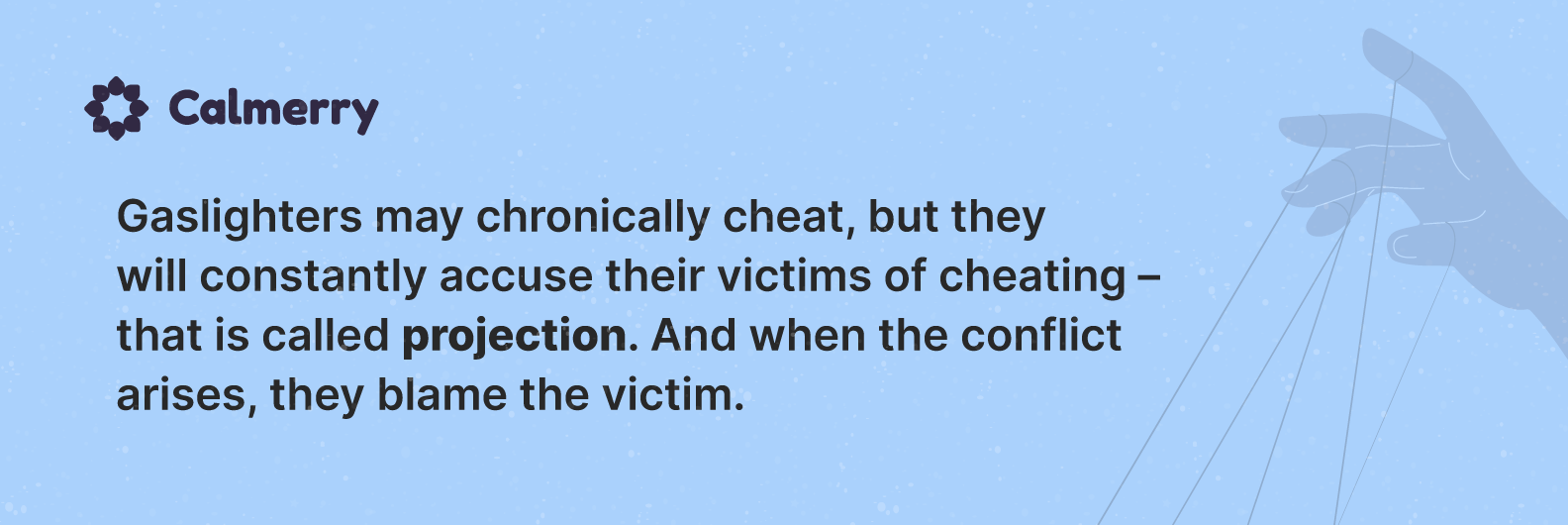
For example, a gaslighter may say, “I cheated, but it’s your fault. If you were a better wife, I would not have looked for affection elsewhere.”
Keep in mind that in personal relationships, gaslighting tends to occur alongside other types of emotional abuse and may escalate into physical violence. If you believe you are experiencing abuse from a partner or a family member, you should seek support.
Contact the national domestic violence hotline for advice on creating a safety plan. It is also helpful to talk to a therapist who can help you cope with the consequences of experiencing abuse in your relationships.
Child-parent relationships
Since there is a natural power imbalance between parents and kids, all parents are susceptible to gaslighting, especially if they are unaware that this behavior could harm their children.
Mostly, gaslighting is done subconsciously because all parents have an innate instinct to protect their kids. Many parents may unintentionally gaslight their kids without them realizing they are doing it.
But sometimes, it can turn into a form of obsession. That happens when parents start believing that they know what’s best for their children and that only their opinion matters.
If you are concerned that you may be gaslighting your kids, here are some signs to look for:
- Ignoring or denying your child’s subjective experiences, questioning their memories
- Trying to compete with your child or show how better or smarter you are
- Blaming your children for your problems and how you feel
- Never apologize for your mistakes and doing something wrong
- Comparing your child to another child or their sibling
- Diminishing your child’s success
- Restricting their time with friends and promoting isolation
Most parents never intend to harm their kids with words. But it’s important to realize how your actions and words may impact your child.
You should take a more constructive and healthy approach when interacting with your children to avoid falling into the trap of gaslighting.structive and healthy approach when interacting with your children to avoid falling into the trap of gaslighting.
Gaslighting at the workplace
Chronic gaslighting could make your workplace toxic, and it is associated with manipulation, intimidation, and discrimination. Although gaslighting at work is subtle and often hard to prove, it’s more harmful than you might think.
It can negatively impact overall work morale, creating a culture of distrust and discomfort. Such manipulative behavior can negatively impact your self-confidence, diminish your self-esteem, and result in burnout.
Here are some signs you may be gaslighted at work:
- You have to do extra just to prove yourself.
- You don’t have a clear idea of what is expected of you, and it is hard to get clarity (or you receive criticism for trying to gain clarity).
- Your boss might blame you for the mistakes you don’t make.
- You never get credit for your work unless there’s an issue, and it’s all your fault.
- You often feel incompetent and powerless.
Most likely, gaslighting at the workplace will be done by someone in a position of power and authority, like a boss or a manager, but it could also be a co-worker or a client.
Typical gaslighters at work can be characterized as addicts, narcissists, and even sociopaths – their need to control others can stem from different pathologies, for example, jealousy, insecurity, incompetence, or even plain pettiness.
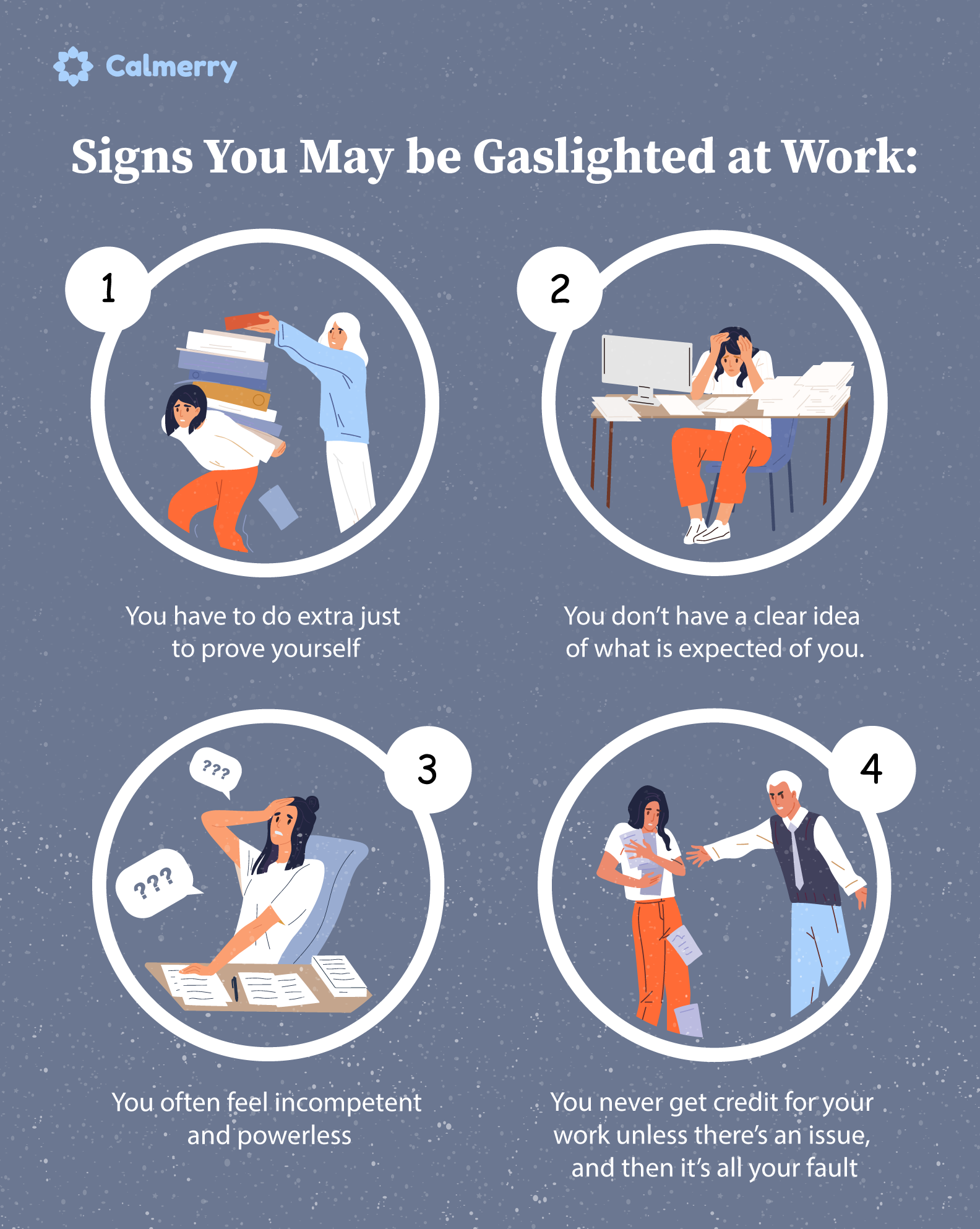
They will actively undermine your accomplishments, lie, project their faults onto you, make false promises, and insinuate that you are the incompetent one.
They will block your opportunities, excluding you from professional development, networking, advancement, and promotion when you’re qualified to participate, without reasonable judgment, to make you question your self-worth.
They might make you feel like you’re doing everything wrong or like you’re an imposter.
Gaslighters don’t want you to succeed at all, and they will sabotage your efforts. For example, they might unexpectedly change the deadlines in the middle of a project, and you will have to pull all-nighters to get it done on time.
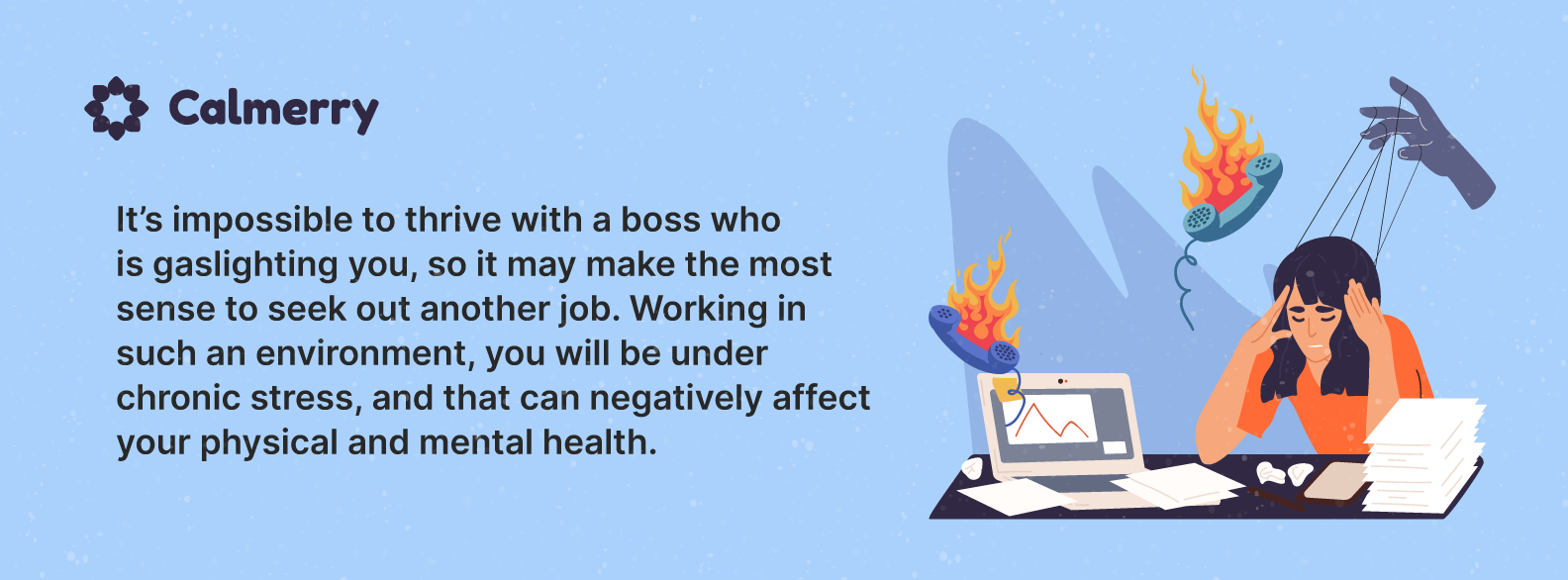
Medical gaslighting
Medical gaslighting occurs when a medical professional dismisses a person’s health concerns or trivializes them based on the assumption that this person is mentally ill.
For example, they may tell you you are imagining your symptoms or question your sanity. And you may doubt yourself or think you’re exaggerating.
Women are more likely to be gaslighted than men. Medical professionals tend to see women as irrational or hysterical and often don’t take their complaints as seriously as the complaints of men.
Women may hear that their pain is emotional and nothing is actually wrong with them, and they are more likely to be prescribed anti-anxiety medication than men.
It’s highly unlikely that medical gaslighting is intentional. More likely, it’s a result of unconscious gender biases or stereotypical views by medical professionals. Or it happens because they fail to acknowledge the differences that exist between women and men.
Racial gaslighting
Racial gaslighting occurs when people use gaslighting techniques to control a group of people based on ethnicity or race.
For example, a gaslighter may deny the fact that a certain ethnic group experiences discrimination even if there is a lot of evidence that says otherwise.
Racial gaslighters might criticize civil rights activists, saying they are too emotional to undermine their message. They may trivialize or downplay racist incidents or even deny such documented events as Holocaust.
Political gaslighting
Confusion, distraction, diversion, and disinformation can also be used to gaslight an entire society. Political gaslighting occurs when a political figure or group uses lies and persistent denials in combination with misdirection and contradiction or manipulates information to control people.
The idea is to wear down the victims by constantly challenging what they believe to be true.
For example, politicians may use controversy to divert attention from important events or issues they consider uncomfortable or threatening. Examples may also include discrediting political opponents based on mental instability or hiding certain things their administration has done wrong.
Ways to counteract gaslighting abuse symptoms and stop gaslighting
So, how to deal with gaslighting if you notice its signs present in a relationship?
1. Remember it’s not your fault
First, you should understand that you are not to blame if you are experiencing any form of manipulation in any relationship. If someone is gaslighting you, it’s their choice to behave this way, and they are responsible for all their actions.
Don’t accept responsibility for their behaviors.
Remember that you can’t control gaslighter’s behavior, and it’s not your fault that they made this choice.
2. Don’t try to argue with a gaslighter
They don’t respect boundaries and don’t like any critical, negative feedback, and typically refuse to acknowledge what they’re doing.
Don’t argue about your truth with your partner; you’ll just waste your time and energy trying to convince them. They can become highly aggressive and hostile and try to regain control by doubling down on their attack.
3. Cut off the communication
The best thing you can do is get away from them – leave and cut off all communication with them or at least block phone numbers, social media accounts, and emails.
Take time for yourself to find your own reality again and have compassion for yourself.
Just remind yourself that healthy relationships, both personal and professional, should be based on open communication, honesty, trust, respect, and support. If you see your relationship with a gaslighter missing these essential qualities, it’s time for a change.
Also, Robin Stern, co-founder and senior advisor to the associate director of the Yale Center for Emotional Intelligence, in his book “Gaslight Effect,” provides useful tips about which relationships can be saved and when to end the relationship.
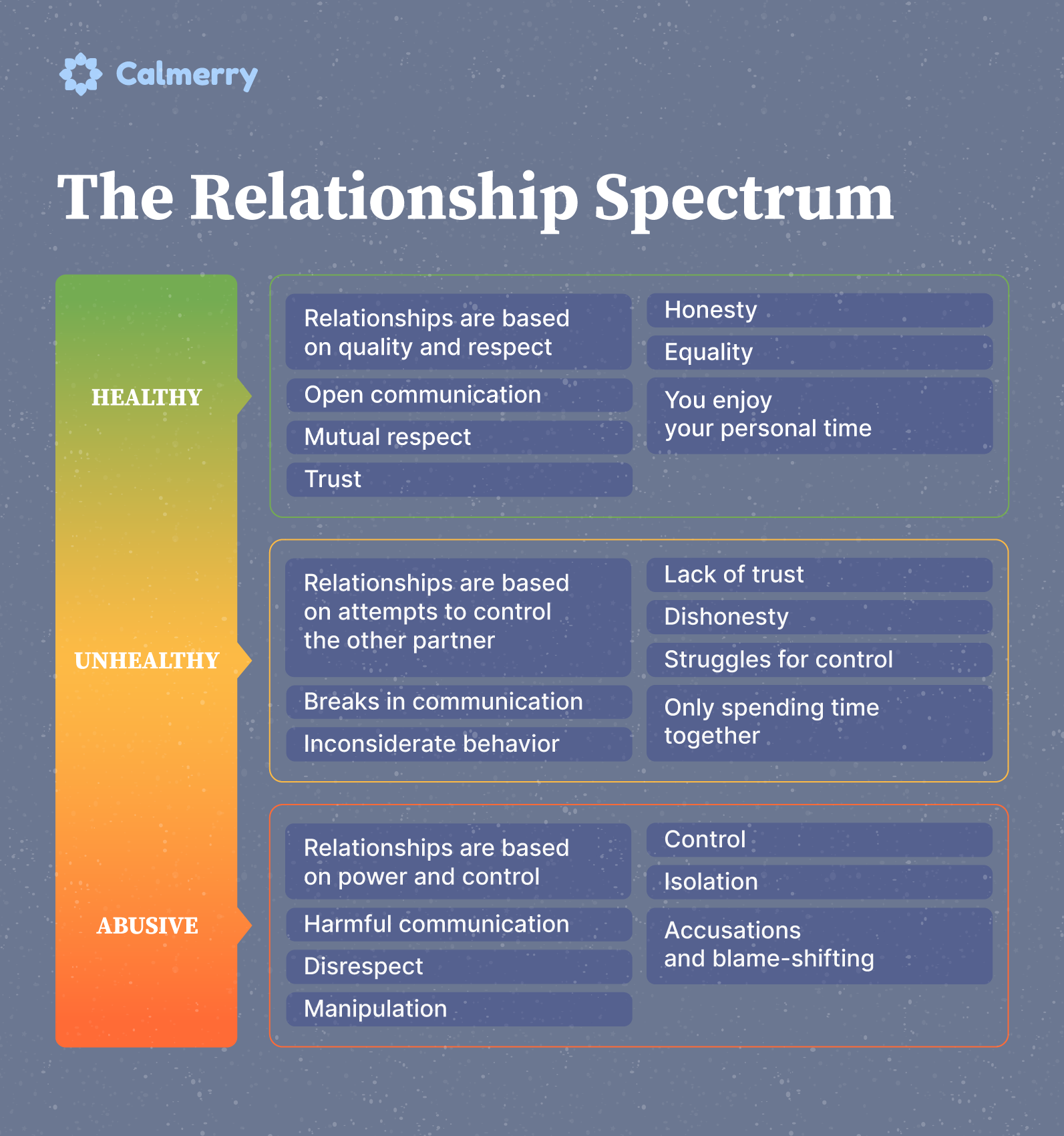
4. Don’t try to fix them
Even though your abusive partner may have convinced you that the toxic pattern is because of you, you should remember that it’s not your responsibility as a victim to fix gaslighting relationships.
And you can’t be blamed for being abused.
5. Know what to respond
You may use phrases like, “We remember things differently” or “What you say is not my experience, and I am not going to debate it with you,” when you are being gaslighted.
If gaslighting happens at work, you should document the incidents, so you are not relying only on your memory.
6. Talk to others about what’s happening
Don’t hesitate to connect with and talk to your loved ones about what’s happening and how you’re feeling. This will give you support and an outside opinion of the situation.
Also, talking to others will help you confirm that you’re not making things up and bring your sense of reality back.
7. Focus on actions, not words
When you feel that you’re being gaslighted, it’s important to focus on the actions, not words of a gaslighter. Even though you can’t control anyone’s actions, you should pay attention to what they do so you can decide how to respond.
8. Practice trusting yourself again
Gaslighters often make others doubt what they know is true, so remind yourself that you’re right about your perceptions. They can do anything to make you feel like you’re losing your mind, but you should stay strong and true to yourself to protect your well-being.
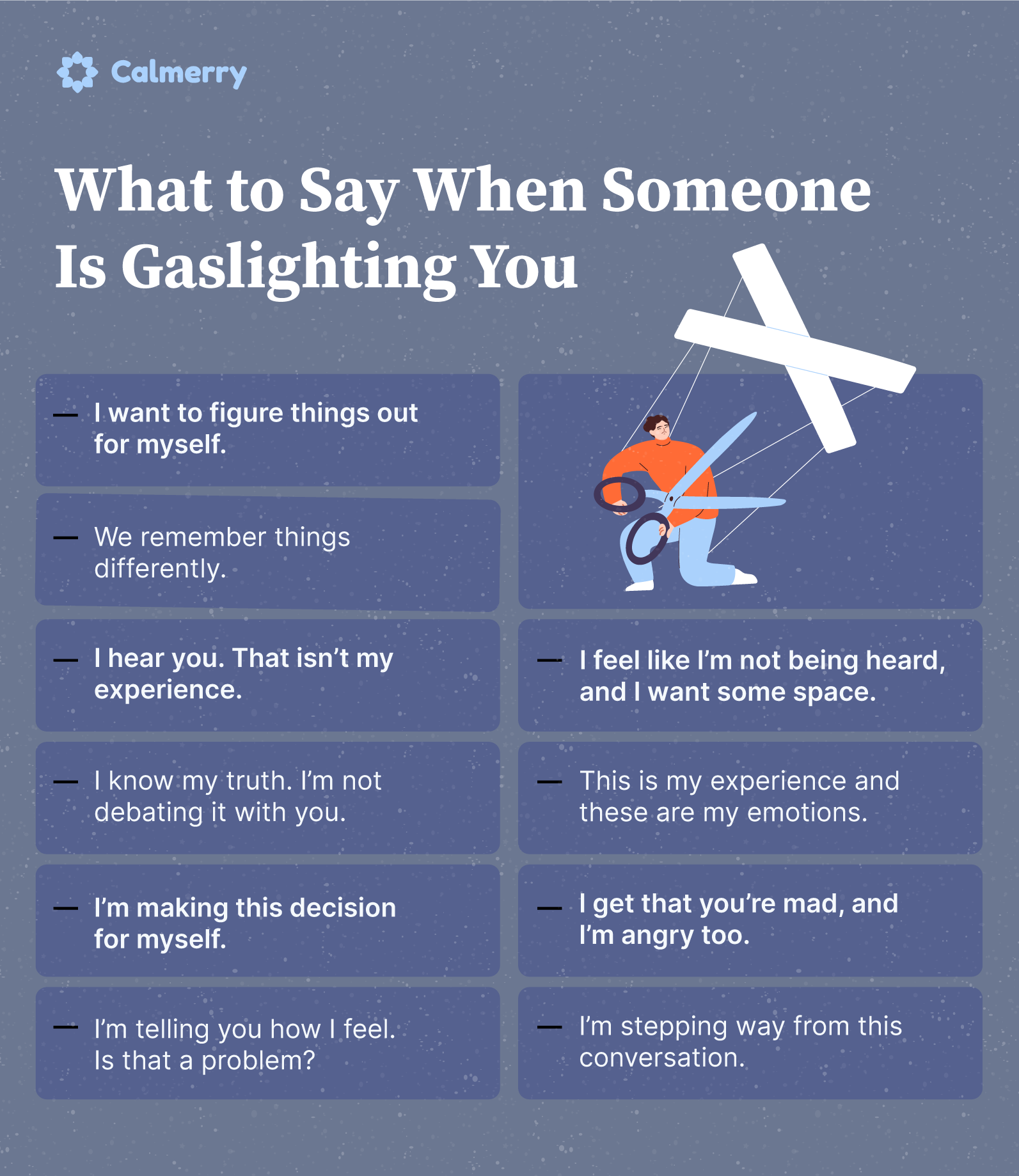
When to seek professional help
Persistent gaslighting causes chronic stress and severe emotional distress and can be catastrophic for the mental health of the gaslighter.
If you suspect you are being gaslighted, you should talk about your concerns with a third party, like an unbiased friend of a counselor, to get their perspective.
Speaking with a person you can trust will help you think more clearly.
It’s important to seek professional help because this form of emotional abuse can negatively impact your self-esteem and lead to a lifetime of self-doubt if you leave it unaddressed.
A licensed psychoanalyst can help you sift through your fears and doubts and understand what is happening to you.
FAQ
What is an example of gaslighting?
An example of gaslighting can be a boss who tells you that you did a task they gave you incorrectly. They continue to insist on it, even when you say that you followed their instructions. Their behavior can make you second-guess what you know to be true.
The boss can also change the story and make other false statements to make you doubt your memory.
What causes a person to gaslight?
People gaslight others for several reasons:
- They are selfish and believe only their feelings are the most important
- Some people love power and use manipulation techniques to control others
- Gaslighters believe that only their version of events is valid
- They defend themselves when their actions are questioned
What is the behavior of gaslighting?
Gaslighting behavior is about manipulating one’s perception of reality, often by denying facts, lying, or twisting information. This can lead to gaslighting when the victim starts to doubt their own memory.
What are the 5 types of gaslighting?
Gaslighting is divided into the following types:
- Outright Lying
- Coercion
- Scapegoating
- Reality Questioning
- Trivializing
What is scapegoat gaslighting?
Scapegoat gaslighting is a type of psychological abuse when a person puts all the responsibility for their faults on their victim.
How does gaslightings affect a person’s mental health?
Gaslighting can make a gaslighted person feel isolated, confused, anxious, and depressed. Besides, it can result in a diminished sense of self-worth.
Is gaslighting always intentional?
Not in every case gaslighting can be considered intentional. Sometimes, people who gaslight don’t fully understand or notice their behavior. Also, gaslighters may think that their behavior is totally normal and use some kind of manipulation on a regular basis.
What can you do if you think you’re being gaslit?
If you feel like you’re being gaslit, you should be ready to take some steps to protect yourself and your well-being:
- Stop communication
- Know how to respond
- Don’t quarrel with a gaslighter
- Don’t take their words to heart, focus on actions
- Don’t blame yourself for such behavior towards you
- Learn to trust yourself again
Final thoughts
Gaslighting is an insidious form of manipulation, and the antidote to gaslighting is recognizing the truth and trusting your own perception.
Platforms like Calmerry connect individuals with professional therapists tailored to their specific needs.
Online therapy can be a great recovery guide to help you manage your emotions and promote wellness.
With therapy, you’ll become more equipped to make healthy choices and set boundaries with other people. You’ll also learn how to manage doubts and anxious thoughts and develop coping skills.
Don’t let the gaslighter control you and break your sense of reality.
online therapy
live video session


